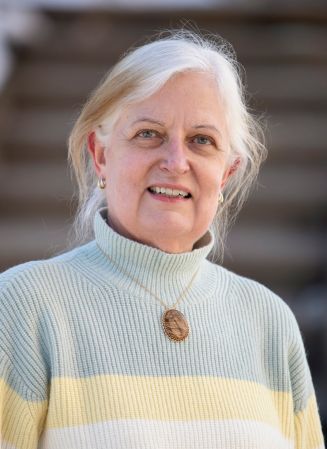On September 9, the National Science Foundation announced it will fund a new endeavor to bring atomic-level precision to the devices and technologies that underpin much of modern life, and will transform fields like information technology in the decades to come. The five-year, $25 million Science and Technology Center grant will found the Center for Integration of Modern Optoelectronic Materials on Demand—or IMOD—a collaboration of scientists and engineers that spans 11 universities and a range of academic disciplines.
“Our role in this endeavor is well aligned with Lehigh’s existing research strengths and activities,” says Elsa Reichmanis, Professor and Carl Robert Anderson Chair in Chemical Engineering at Lehigh, who serves as Lehigh’s lead investigator and as Director for Integrative Partnerships for IMOD. “This is very fertile ground for engagement and interdisciplinary collaboration among students and faculty, across campus, and across the network of researchers involved in the broader initiative.”
IMOD on a mission
IMOD research will center on new semiconductor materials and scalable manufacturing processes for new optoelectronic devices for applications ranging from displays and sensors to a technological revolution, under development today, that’s based on harnessing the principles of quantum mechanics.
“In the early days of electronics, a computer would fill an entire room. Now we all carry around smartphones that are millions of times more powerful in our pockets,” said IMOD Director David Ginger, the Alvin L. and Verla R. Kwiram Endowed Professor of Chemistry at the University of Washington. “Today, we see an opportunity for advances in materials and scalable manufacturing to do the same thing for optoelectronics: Can we take a quantum optics experiment that fills an entire room, and fit thousands—or even millions—of them on a chip, enabling a new revolution? Along the way we anticipate IMOD’s science will help with a few more familiar challenges, like improving the display of the cell phone you already have in your pocket so the battery lasts longer.”
In her role as Director for Integrative Partnerships, Reichmanis will build on her extensive experience in research at the interface of chemical engineering, chemistry, and materials science, spanning from fundamental concepts to technology development and implementation.
“My focus in this initiative is to work with IMOD partner institutions to establish a knowledge transfer program that prepares students to interact with industry, academia, and government partners, while encouraging entrepreneurship and spinoffs,” says Reichmanis, a Fellow of AIChE and of the National Academy of Inventors, as well as a member of the National Academy of Engineering. “We seek to accelerate the pace at which NSF research has translational impact and enhance the capabilities of a diverse, inclusive cohort of young and emerging researchers in conducting team-based science across professional environments.” Reichmanis will also lead the creation of an industrial partnership program to provide center participants with opportunities for direct engagement with students around research mentorship, internships, and other initiatives.
“NSF Science and Technology Centers are integrative not only in the sense that they span traditional academic disciplines, but also in the sense that they seek to benefit society by connecting academic research with industrial and governmental needs, while also educating a diverse STEM workforce,” says Ginger. “To this end, we’re extremely lucky to have had the support of an amazing list of external partners across the fields of industry, government and education.”
The 11 academic institutions that make up IMOD are the University of Washington; the University of Maryland, College Park; the University of Pennsylvania; Lehigh University; Columbia University; Georgia Institute of Technology; Northwestern University; the City College of New York; the University of Chicago; University of Colorado at Boulder; and the University of Maryland, Baltimore County.
A partial list of IMOD’s external partners includes companies such as Amazon, Applied Materials, Corning, Microsoft, Nanosys, and FOM Technologies, Inc., and government organizations such as the National Renewable Energy Laboratory, the Pacific Northwest National Laboratory, and the Washington State Department of Commerce.
For more about IMOD, read the official announcement from University of Washington.
About Elsa Reichmanis
Elsa Reichmanis is Anderson Chair in Chemical Engineering in the Department of Chemical and Biomolecular Engineering at Lehigh University. Prior to joining Lehigh, she was Professor and Pete Silas Chair in Chemical Engineering in the School of Chemical and Biomolecular Engineering at the Georgia Institute of Technology. She started her independent career at Bell Labs where she was Bell Labs Fellow and Director of the Materials Research Department. She received her PhD and BS degrees in chemistry from Syracuse University. Her research interests include the chemistry, properties, and application of materials technologies for photonic and electronic applications. She has had impact in the design of new imaging chemistries for advanced lithographic applications, and designed one of the first readily accessible and manufacturable polymers for advanced silicon device manufacturing using 193 nm lithography.
The Reichmanis research group is currently exploring polymeric and hybrid organic/inorganic materials chemistries for a range of device and electronic and sustainable energy applications. Her research, at the interface of chemical engineering, chemistry, materials science, optics, and electronics, spans from fundamental concept to technology development and implementation, with particular focus on polymeric and nanostructured materials for advanced technologies. Currently, efforts aim to identify fundamental parameters that will enable sub-nanometer scale dimensional control of organic, polymer and/or hybrid materials for applications including transistor devices, photovoltaics, and high-capacity energy storage.
Reichmanis was elected to the National Academy of Engineering in 1995 and has participated in several National Research Council (NRC) activities. She was an elected member of the Bureau of the International Union for Pure and Applied Chemistry (IUPAC); and has been active in the American Chemical Society throughout her career, having served as 2003 President of the Society. Elsa Reichmanis is the recipient of several awards, including the ACS Award in the Chemistry of Materials (2018), the ACS Award in Applied Polymer Science (1999), the ASM Engineering Materials Achievement Award (1996), and the Society of Chemical Industry’s Perkin Medal (2001). In other service, she is an Executive Editor of the ACS Journal Chemistry of Materials.

